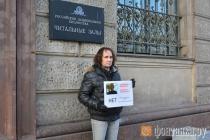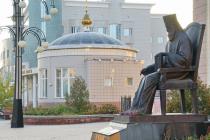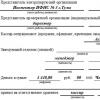" dated March 27, 1992 No. 313, is a particularly valuable object of national heritage and constitutes the historical and cultural heritage of the peoples of the Russian Federation. The Russian National Library is one of the largest libraries in the world, the second largest in Russia. It has long become a national symbol of culture and enlightenment. Therefore, the threat of turning “Publichka” into a provincial institution caused a great response in the cultural community of St. Petersburg.
Why does the problem deserve public attention?
The media reported that Minister of Culture Medinsky turned to Dmitry Medvedev with a request to support the proposal of the Russian State Library (V. I. Gnezdilov) and the Russian National Library (A. I. Visly) to merge.
Director of the Russian National Library Alexander Visly Photo: tass.ru
3. Put under control the process of completing the construction of storage facilities for the new building of the National Library on Moskovsky Prospect (second stage) and timely repairs of other library buildings.”
open letter to President V. Putin.
I joined their opinion
single pickets. With a poster “To Shumilov - Public! Public - St. Petersburg! historian and publicist Daniil Kotsyubinsky came out. He was followed by the director of the Center for Independent Sociological Research, Viktor Voronkov, and the leading researcher at the St. Petersburg Institute of History of the Russian Academy of Sciences, Boris Kolonitsky, and then the senior researcher at the Higher School of Economics in St. Petersburg, Dmitry Kalugin.

Daniil Kotsyubinsky, photo Fontanka.ru
distributed books, illustrating their protest with a poster: “People of St. Petersburg! Take the books! Moscow will take them away too!”

Deputies immediately
Committee

Already following 1
A little earlier, RBA President V. Firsov, making the library community worried because of the long silence, said that “merging libraries as one legal entity, from my point of view, is inappropriate”, after all “By and large, it is the MFN that is an integral element of Russian civilization.” Let's remember that it was this historical and cultural argument that was voiced in the very first speeches of respected professors: A. Mazuritsky, A. Sokolov, V. Leonov, Yu. Stolyarov. Two Muscovites and two Leningrad-St. Petersburg residents, whose total experience in library service is almost equal to the age of the National Library! It was they who were the first to point out the very absurdity of raising the question of unifying national libraries. Everyone who decided to publish their opinion in the media expressed their position unequivocally: “We are against the merger!” 310 employees of the National Library sent a letter to the President of the Russian Federation with a request to understand the current situation and protect the National Libraries from incompetent administrative interference.
From the point of view of the law, it is possible to unite the RSL and the RNL through a merger (creating a new legal entity) or annexation. In reality, another metropolitan “takeover” may occur. St. Petersburg will get the “tail” of the new organization. The National Library will cease to exist in its status, and its 200-year history as the national library of our country will end. Many readers and scientists do not want to admit this. The petition “Against the destruction of the Russian National Library” received about 7,000 signatures on the Internet. There have not yet been any specialists ready to publicly support the idea of merging the RNL and the RSL.
In a number of constituent entities of the Russian Federation, the process of “optimization” by joining children's, youth and libraries for the blind to central universal libraries has been actively going on in recent years. Without any involvement of the scientific and library community in the discussion. After all, the law does not require justification for decisions made by founders within their competence. Social standards prepared by the Ministry of Culture for the regions make it possible to reduce the network of municipal libraries in the country by 30–40%. Who needs a library policy like this?
So, can we be sure that making a “closed” decision has become impossible?
Alexander Visly in his interview with Ekho Moskvy radio said directly: “...what is being discussed by the public is also very good. This prepares the ground for some sensible, correct decisions that will be made at the highest level.” What kind of correct decisions can be discussed at the government level? If we talk about combining electronic resources, using common technological solutions and coordinating scientific activities, then these issues are within the competence of the Russian State Library, the National Library of Russia and the Ministry of Culture, which performs the functions and powers of the founder, enshrined in the statutes of the Libraries by the Government. “Whether an administrative unification is necessary is not a matter of my competence, it is a matter of the competence of the Government itself, not even the Ministry of Culture. So let it decide,”- says A. Visly. But there is still no answer to a simple question: what proposal did the leaders of the RSL and the NRL initially approach the Chairman of the Government with, what proposal did V. Medinsky ask the Prime Minister to support? Alas, this “reference point” for the entire problematic situation has not been presented to society.
At a press conference dedicated to the plan to unite the two largest Russian libraries, the Russian State Library in Moscow and the Russian National Library in St. Petersburg, the director of the latter surprised journalists and colleagues with a statement: the library stores too many copies of “Eugene Onegin”, and “two or three” would be enough " And in general: “Why do we need libraries if everything is on the Internet?”
Alexander Visly, director of the Russian National Library
After journalists learned of plans to merge Russia's two largest libraries, the Russian State Library in Moscow and the Russian National Library in St. Petersburg, into one institution, bibliographers, scientists and journalists are concerned about the possible consequences of such a merger. In St. Petersburg, people picket, sign petitions against the merger, and hold conferences at which they explain how two large libraries are better for the country than one.
On Wednesday, March 1, ITAR-TASS organized a press conference with the directors of two libraries - Vladimir Gnezdilov and Alexander Visly (). The head of the St. Petersburg library, Visly, made several statements that surprised and worried journalists. About it wrote on Facebook historian and journalist Daniil Kotsyubinsky.
Today, at a press conference in ITAR-TASS, for the first time in my life I realized what a pure bibliographic idiot is. That is, a person who does not understand at all what a book is and what it is needed for.
According to Visly, Russian libraries do not need “too large an influx of paper books.” At the same time, the library director, judging by his words, does not understand the difference between the concepts of “copy” of a book and “edition”.
It is much cheaper to keep one electronic copy and one printed copy in the library than two printed copies. And even if a printed copy is lost, it is always possible to make a printed copy from an electronic copy and replenish this printed copy.
After all, each copy of the library needs And“to take” (with emphasis on the “and”), the director complained, and that’s two carloads of books every year. Do you really need so many books?
There is a very simple question: how many copies should “Eugene Onegin” be in electronic form? Well one, well two, well three, right? How many printed copies of “Eugene Onegin” does each national library actually store? More than ten thousand. Therefore, there is still no need to digitize everything printed.
Kotsyubinsky points out that for a library director this level of understanding is a sign of professional incompetence:
Natalia Sokolovskaya, who was sitting next to me, almost jumped with indignation: “Doesn’t he understand that these are all different books?” No, he doesn't understand! Because he probably doesn’t know that books have prefaces, notes, and illustrations. That the book is not an “electronic letter carrier”, but also a monument to that era and the circumstances under which it saw the light. That, for example, the text of “Eugene Onegin” changed depending on the time of publication...
At the very beginning of the press conference, Alexander Vislyi wondered why libraries are needed at all if everything is on the Internet. During the event, the director of the National Library did not give an answer.
Director of the RSL Visly does not understand why the RSL has 15,000 different copies of “Eugene Onegin” and believes that it is enough to have 2-3 editions
“Russian Imperial Library”, “everything is on the Internet”, reduce the receipt of books and magazines by 1 million per year https://t.co/W7zaf7qiQi
Russian Chronicles (@letopisi_rus)
The Russian National Library (RNL), according to the decree of the President of Russia, is a particularly valuable object of national heritage and constitutes the historical and cultural heritage of the peoples of the Russian Federation. The Russian National Library is one of the largest libraries in the world, the second largest collection in Russia, and now a serious threat hangs over it - they want to optimize it and merge it with the Russian State Library. This, in turn, will lead to the fact that the National Library will lose the right to receive legal deposit of new book publications, which is now guaranteed to ensure the acquisition of its collections. The destruction of the National Library as an independent entity will deal an irreparable blow not only to Russian science and St. Petersburg as the cultural capital of Russia, but also to the entire national library business. Let me remind you that in the Year of Literature the country has already lost the INION RAS library, and the new acting. Director of INION Ilya Zaitsev now directly states that the country does not need the “pre-fire” INION: “The world has changed. You can order any book in any country. Translating it is also no problem. A huge amount of information on the Internet. Therefore, that INION does not correspond to modern realities,” Polit.ru quotes Zaitsev as saying.
www.nlr.ru
Perhaps this can be said about other large libraries? But here is a wonderful commentary to Zaitsev’s words from INION employee Svetlana Pogorelskaya: “This is not true. Firstly, “any book in any country” you can not “order”, but BUY. Neither a student nor a graduate student can afford this. They need a copy of this book or a license that allows computer access to a digitized version of this book. Secondly, “translating will not be a problem” (c) - yeah, well, yes - machine translation from Japanese into Russian via Google, for example. Thirdly, on the Internet, all access to archives and articles is paid, you need to buy licenses, and for this you need a library. It’s amazing how people look from their rich perspective, without even taking into account that the library and abstract services of the institute are for those who can NOT “order a book in any country” and “translate it without problems”, for students, graduate students, for scientific personnel in Russian regions "The world has changed", yeah. Some became rich, while others became poor, and the rich stopped understanding the poor.” She is worried that “Monsieur’s plans, at the instigation of FANO, are to halve or quarter the book stocks.”
The problem with the INION library and the Russian National Library fits perfectly into the logic of the current government, which seeks in every possible and impossible way to reduce government spending on science and culture and generally reduce the diversity of various cultural institutions. The RNL also changed its director in 2016 - by decision of the Minister of Culture, Alexander Visly, who headed from 2009 to 2016, was appointed to this position. Russian State Library. No one really hid what tasks were assigned to the new leader, who himself said in an interview with the Izvestia newspaper in February 2016: “There were historical precedents and showed that there is nothing wrong with merging libraries.” It is quite obvious that Visly was transferred to St. Petersburg to successfully conduct a special operation to eliminate the NSL as an independent structure.
The new general director of the Russian National Library has already begun to give away library buildings to the insatiable Russian Orthodox Church, which is swallowing more and more objects of cultural significance. Thus, by September 1 of this year, the Russian National Library will transfer to the St. Petersburg diocese one of its buildings on the Obvodny Canal (it was built in the 1880s). Like Visly: “The building is being transferred to the Russian Orthodox Church. Of course, this is not such a pressing issue as with Isaac, because this building used to belong to the church. But there is a very valuable fund there, personal libraries are kept there...”
On January 10, an expert in the field of library science, Doctor of Pedagogical Sciences Alexander Mazuritsky wrote that the project to merge the Russian National Library and the Russian State Library was nearing its final stage: “And then it became known that just before the New Year, the Chairman of the Government of the Russian Federation received an appeal from the Minister of Culture Russian Federation V.R. Medinsky with a request to support the joint proposal of the Russian State Library (V.I. Gnezdilov) and the Russian National Library (A.I. Visly) on the merger. The argumentation of the authors of the appeal has also become known. They assure that the merger of the RSL and The National Library will ensure the creation of the world's largest national library (more than 30 million books and more than 1.5 million copies of handwritten and printed book monuments), will eliminate duplication of functions and increase the efficiency of the united library."

Director of the Russian National Library Alexander Visly. Photo: TASS
“Moreover,” as Mazuritsky notes, “according to A.I. Visly and V.I. Gnezdilov, the merger of libraries will halve the number of copies of printed materials required for “eternal” storage, which will provide an opportunity for 15-20 years solve the problem of the lack of space to accommodate new acquisitions. (Attention! In fact, this cheerful declaration means that one of the megacities - Moscow or St. Petersburg - will not receive legal copies of all publications published in Russia (and in fact both have advanced scientific and educational centers!), or at worst they will be distributed between the library and its... branch according to the principle: this is for me, this is for you, this is also for me.)"
A petition has now been created on Change.org "Against the destruction of the Russian National Library". To date, it has been signed by more than 2 thousand people. The petition contains the following demands: “In connection with the current situation, we, employees of scientific, cultural and educational institutions of St. Petersburg, consider it necessary:
1. Preserve the independence of the Russian National Library, as the oldest public library in Russia, having the status of a particularly valuable cultural object.
2. Preserve the right of the National Library to receive legal deposit in accordance with the Federal Law “On Legal Deposit of Documents” dated December 29, 1994, No. 77-FZ.
3. Put under control the process of completing the construction of storage facilities for the new building of the National Library on Moskovsky Prospect (second stage) and timely repairs of other library buildings.”
These proposals are quite reasonable, but their implementation will require the active participation of the entire civil society, concerned about the state and preservation of Russian culture. Honored librarians have already sent an open letter to President Putin, in which they expressed their protest against the merger of the largest libraries." "In our country, there has been a long-term and consistent destruction of the library system. The network of municipal libraries is annually reduced by 700 - 900 institutions, and there is an outflow of qualified personnel. Library school and library science are in crisis. The library policy of the Russian Ministry of Culture contradicts the “Fundamentals of State Cultural Policy,” which provide for the preservation of libraries as a public institution for distributing books and introducing reading. Particularly alarming is the intention to merge the two largest national libraries - the Russian State Library (RSL, the former State Library of the USSR named after V.I. Lenin in Moscow) and the Russian National Library (RNL, the former State Public Library of the RSFSR named after M. E. Saltykov- Shchedrin in St. Petersburg),” says their letter, signed by three doctors of science Valery Leonov, Arkady Sokolov and Yuri Stolyarov.
The authors of the letter also state: “We find it absurd and regrettable that the fate of Russian libraries is decided by outsiders without the participation of library professionals, that library functionaries and ministerial officials dictate what kind of national libraries we need.<...>We ask you to prevent the upcoming anti-library, anti-cultural action."
On January 11, a press conference was held by RNB General Director Alexander Visly, at which he did not deny information about the impending merger. “Conversations that “something needs to be combined” have been going on in the country’s two main libraries for 20 years, and now there is just another surge,” the official hastened to reassure. - I even saw the draft government decree of 2002. The story is clear: two national libraries in the country are a lot, but three is a bit too much (the Yeltsin Library also has national status). Now this story has arisen again... I think time will pass, and it will arise again, then again and again...,” Novaya Gazeta - St. Petersburg reports Visly’s words. When asked to name the advantages of the merger of the National Library and the Russian State Library, the general director replied that there would be a reduction in library staff: “If you combine computer services, economic and financial, then it is clear that there will be benefits.” The peculiarity of the moment, according to Visly, is that “the consolidation of electronic resources is inevitable, and it is moving forward.” Alexander Visly did not answer Novaya Gazeta’s direct question whether the appeal was sent to Prime Minister Medvedev or not. He also refused to name the initiators of the draft of such a document.
Let me remind you that the philosopher Alexander Rubtsov wrote an article back in October 2013, “Why the Russian government has been seized by merger mania,” in which he noted that “the frantic attempts of officials to create something big and great are harmful to both the Academy of Sciences and the Mariinsky Theater.” As Rubtsov rightly writes: “It’s no longer a matter of specific situations, but of the mania itself to leak everything, be it science, art, winter time or time zones. Why is it now that overly playful hands suddenly began to reach for objects that the authorities protected centuries - both in liberal periods, and in attacks of autocracy, and in enlightened reigns, and even in times of ideological obscurantism no worse than the present one." He answers the last question as follows: “The authorities in Russia are generally uncomfortable with this complexity of the country and with its size. But now this is getting worse. The ancestors had “small chain mail” - this is clearly great. The outstanding Russian economic geographer Leonid Smirnyagin once accurately noted: These guys are constantly bothered by the fact that the country is big..."
Writer Mikhail Zolotonosov also wrote the following about the plan to merge the largest libraries in Russia: “The project begins with gigantomania, characteristic of all totalitarian regimes.<...>They will explain to us that, firstly, you can go to Moscow (or, conversely, to St. Petersburg) to get the book you need, and secondly, a National Electronic Library (NEL) is being created, and it goes to one of two libraries (more precisely, to one from two EB buildings), the paper book will be immediately digitized, and the digital copy will be sent to the building where there is no paper original. The idea is rotten and vicious in principle, since, firstly, the paper original of the publication and its image on the computer are fundamentally different things, working with paper originals is much more convenient than manipulating scroll bars (this is especially true for Ogonyok format magazines and newspapers, watching which de visu, say, for a year on the screen is pure torture), and it is no coincidence that the scroll in the process of cultural evolution was replaced by a codex; in addition, all illustrations look completely different on paper and on a computer; secondly, one can imagine the number of errors with which digitization will be carried out (this number of errors can be judged, for example, from the American project books.google); thirdly, as is known, the entire NEB project contradicts existing copyright legislation (it is no coincidence that Vislyi admitted that he was seeking at least partial abolition) and will only spur the circulation on the Internet of pirated copies of paper books, which will go from libraries to "Big world"; fourthly, the existing technological level of storing information in digital form does not provide durability and reliability comparable to the reliability and durability of paper as an information carrier (paper is many times more durable), and in relation to water and fire, paper and microcircuits are equally defenseless; fifthly, the National Library and the Russian State Library are two national repositories of printed publications, and must duplicate each other; this is fundamentally important, because it ensures reliability in case of disasters (remember the fires at the BAN and INION)."
But here is the opinion of the famous philologist Hasan Huseynov: “Neither during wars, nor during revolutions, nor in the era of ideological persecution, were there any encroachments on the national heritage of the country. Why did they encroach now, today? The answer is obvious: someone wanted to get historical monuments in the city center buildings created at one time specifically for national libraries - as it was, is and will be in all developed countries, where national and university libraries are expanding, even neighboring<...>If the report about the very plans to move and merge the two largest libraries is not a stupid rumor, but true, then this is evidence of dangerous administrative degradation, the consequence of which will be cultural and scientific degradation. Maybe it’s even useful to show with a living example how absurd bureaucracy can descend. And yet, it is infinitely pity for the next generations who will simply run away from predatory savagery, hiding behind reform..."
I myself agree with Professor Guseinov and believe that such experiments on objects of Russian national heritage are completely unacceptable, and even more so such decisions should not be made without long and thorough consultations with the cultural and scientific expert community. I urge everyone to sign the online petition in defense of the National Library and preserve the main library of St. Petersburg as an independent entity.
The Russian Orthodox Church (ROC) did not send an application for the transfer of St. Isaac's Cathedral to the Property Relations Committee (PRC) of St. Petersburg, without which the committee's order has no legal consequences, its representative said at a court hearing on Monday, March 13, Interfax reports.
“An application from a religious organization was not submitted in the manner prescribed by federal law. The decision cannot be made in its absence,” she said. According to her, the committee’s order dated December 30, 2016 on the procedure for preparing for the transfer of the cathedral “does not have legal consequences.”
Deputy Boris Vishnevsky, who participated in the process as one of the plaintiffs, drew the court's attention to the governor's response to a collective deputy request. In it, Poltavchenko was asked about the presence of an application to the KIO from a religious organization.
“It clearly follows from the answer that there is no application, and the order of the KIO, which we are challenging, has a direct reference to the received appeal. If this appeal is not there, but there is something else, then this is not within the framework of Federal Law 327. This means that this cannot have legal significance and no order can be issued on the basis of this,” Vishnevsky said.
“The committee did not receive an appeal from a religious organization. But the contested order was issued on the basis of an appeal from a religious organization received by the governor of St. Petersburg. The committee, for its part, is ready to provide this statement,” a representative of the KIO said in response.
In St. Petersburg, a meeting was agreed upon regarding Isaac, the merger of the Russian National Library with the Russian State Library and the development of the Pulkovo Observatory
The Committee on Law and Order of the government of St. Petersburg allowed to hold a city protection rally on Saturday, March 18, regarding the transfer of Isaac to the Russian Orthodox Church, Maxim Reznik, head of the commission on education, culture and science of the city Legislative Assembly, told TASS.
“Smolny agreed for us to hold a rally on the Champ de Mars in the Hyde Park format, that is, up to 200 people, but we are ready to pay a fine for exceeding the number,” the deputy said.
Last week, the city government refused to coordinate a rally with similar themes on the Field of Mars on March 19, numbering up to five thousand people; activists were asked to gather in Udelny Park.
The action is timed to coincide with the 30th anniversary of the activists’ defense against the demolition of the Angleterre Hotel in 1987, where the poet Sergei Yesenin hanged himself. The organizing committee of the rally includes the Growth Party, Yabloko and PARNAS and a number of public organizations, including the Living City, the Russian Creative Union of Cultural Workers, the Union of Scientists of St. Petersburg.
“The action on the Champ de Mars was agreed upon from 12:00 to 16:00. But time is needed to set up the stage. Therefore, it was decided to start the rally at 14:00,” Vadim Sukhodolsky, a member of the organizing committee, told the Rosbalt agency.
The action is called a march, but its structure will be a rally. It will also discuss the protection of the Pulkovo Observatory, which is threatened by residential development in a three-kilometer security zone, and the proposed merger of the country's two largest libraries - the St. Petersburg Russian National Library (RNL) and the Moscow Russian State Library (RSL), which is perceived in St. Petersburg as a takeover of the RNL Moscow library.
St. Petersburg rebelled against the merger of the Russian National Library with the Russian State Library
On March 11, on Ostrovsky Square, St. Petersburg activists launched a poster into the sky with the image of the General Director of the Russian National Library, Alexander Visly, as part of an action against its merger with the Russian State Library. Members of the Free Historical Society published on their website an appeal to Prime Minister Dmitry Medvedev about the situation surrounding the merger of libraries.
“The news of the impending unification caused alarm. There were statements of protest, collective letters signed by prominent figures of the library community, scientists, writers, and public figures. The Ministry of Culture issued statements claiming that there are no plans for unification; opponents of such a reorganization are allegedly fighting with “windmills,” the appeal says.
Meanwhile, as the letter says, Visly does not hide the fact that he considers this kind of “reorganization” plan to be the most desirable. From the merger of the two libraries, both book depositories will suffer, but primarily the National Library, which, according to the authors of the appeal, will become a branch of the Moscow library, “which will supposedly reduce financial costs.”
Previously, Smolny refused to coordinate an action in defense of St. Petersburg on Sunday, March 19, citing the fact that the place would be taken by someone else, and it would no longer be possible to hold an action in the format of a meeting of voters with deputies. The city already has a law requiring deputies to coordinate such events with Smolny.
In January, the Governor of St. Petersburg, Georgy Poltavchenko, approved the transfer of St. Isaac's Cathedral for 49 years to the free use of the Russian Orthodox Church, while maintaining its museum and educational functions. The temple building will remain the property of the city.
Opponents of the transfer of the cathedral tried to challenge Smolny's decision in court, but the claim was rejected. An online petition against the transfer of the cathedral to the Russian Orthodox Church received more than 200 thousand votes. Several protests took place in St. Petersburg.
At the same time, supporters of the transfer of Isaac this year held two religious processions around the cathedral in support of its resubordination to the Church. Patriarch of Moscow and All Rus' Kirill said that the transfer of Isaac to the Russian Orthodox Church is intended to become a symbol of reconciliation of the people.














